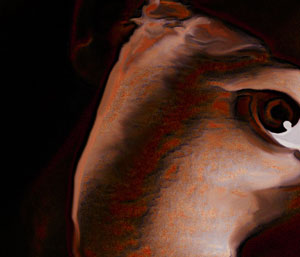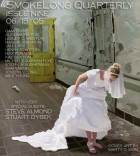How does one know when one is “in too deep?” And is there anything to do except hold one’s breath or struggle to the surface?
Develop gills.
What role does metaphor play in the logic of flash fiction narrative?
Flash fiction, for me, is about a loving brutality—there’s only room to love one element of life in a thousand words, so metaphor has to surprise or shock, or at very least tickle the mind of the reader, because it carries so much weight in a compressed story.
I love that final question, “Who’s really in charge here?” Is it okay if there isn’t an answer?
I think perhaps there would be different answers on different days—when people start playing mind games (or other kinds of games!) they often find the person they’re most perplexing and teasing is themselves. Such explorations rarely have answers that stick: only the sensations become ingrained.
You’ve had remarkable succcess with contests. Besides an enormous cache of talent (which you certainly possess), what does one need to do well on the contest circuit?
A cold, cold eye. I choose contests carefully, knowing that in many I stand no chance—my luck is mainly a result of looking at past winners and seeing whether my work bears any comparison to theirs. I never expect to place and never think about a contest once I’ve sent my entry—that way I don’t torture myself with expectation of the outcome. And I get a nice surprise if I do well.
Your pride in your flourishing fig tree is very nice. So what can one do with a flourishing fig tree and its leaves?
Well, here’s a biblical trick for the summer months. If you have a fig tree, you can break off a few fig leaves and stick them together with the sap that comes from the break—fig leaf aprons are easy to manufacture, a fact which is sadly unknown to many. Do it in old clothes though—fig tree sap is incredibly sticky and persistent.



 The SmokeLong Grand Micro Contest (The Mikey) is now an annual competition celebrating and compensating the best micro fiction and nonfiction online.
The SmokeLong Grand Micro Contest (The Mikey) is now an annual competition celebrating and compensating the best micro fiction and nonfiction online.